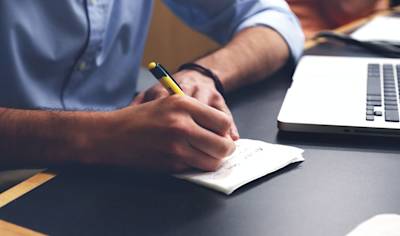
Supersized Guide to Help With Your Real Estate License Exam
Pass Your Real Estate License Exam on Your First Attempt With This Guide

Pass Your Real Estate License Exam on Your First Attempt With This Guide

Jacqueline Kyo Thomas
Need help preparing for your upcoming real estate license exam? We’ve got you covered. Here’s everything you need to do to pass your Massachusetts real estate exam the first time.
Before taking the real estate exam for a real estate salesperson, you must:
1. Take advantage of our Pass or Don't Pay Guarantee. We have a 19% higher pass rate than the state average. If you can pass our practice test, we guarantee that you'll pass the state exam— or we'll refund your class signup fee. Learn more here.
2. Be aware that you'll need to pass a background check before taking your real estate exam. This is required by the state of Massachusetts.
3. Only use study guides that have been published or updated recently. The questions on the real estate exam change over time, and the last thing you want to do is to study from an outdated guide.
4. Make flashcards for real estate terms. Use paper flash cards or go digital with a tool like Quizlet or Cram. Review your flashcards every day at least twice a day.
5. Also review your flashcards whenever you can. We all have small pockets of free time, such as during TV commercial breaks or while waiting in line at the store.
6. Finally, review your flashcards for 5 minutes before you go to sleep. Studying before sleep seems to lock these memories into our brains.
7. Take the practice exams. We offer several exams during our course to prep you for the real deal. Remember to get rid of distractions but keep an eye on the clock. The goal is speed and accuracy.
8. Study with fellow classmates. Get together once or twice a week with a small group. Being in a group makes studying less monotonous and gives you a chance to be social while still being productive. If meeting in person isn't an option, consider meeting on a web-based video conferencing tool like Zoom or Google Hangouts.
9. Chew gum in an unfamiliar flavor. Do it during your study sessions and then again during the exam.
10. Choose a time of day when you're most focused and plugged in. Some people study in the morning. Others study in the afternoon. Test different times to see which one works best for you.
11. Exercise before your study session. The exercise session doesn’t need to be lengthy, it can be as quick as a 10 minute walk outside.
12. Schedule a time to study every single day. Increase your study time as you get closer to the test. A month out, dedicate one hour to studying. Two weeks out, increase your studying to two hours each day. In the week of your exam, bump it up to three hours a day.
13. Split your study time. Instead of sitting down to study for 1 hour straight or more, break it up. Study for 20 minutes and then take a 5 minute break, then return for another 20 minutes. Imposing breaks into your study time gives your brain a chance to rest and digest what you've just studied.
15. Mix up your study topics so that you're focusing on something new each study session. For example, focus on financing during one session and come back to study property disclosures the next.
16. Use an app to block distractions. Try out FocusMe or Freedom.
17. Turn on ambient music to increase your focus while studying. YouTube has a lot of great, long-lasting options. Search for “study music.”
18. Study out loud. It's easier for you to remember something if you hear yourself reading your notes out loud.
19. Teach the material to someone else, like a friend or family member. This can help you retain more information.
20. Avoid pulling an all-nighter before the day of your test. That will only exhaust you and it's unlikely that you'll retain what you've studied. Cramming doesn't work.
21. Create a one-page “cheat sheet” with all of the information that you want to remember. Bring that with you the day of your exam and try to memorize what you've written down. (Take a mental snapshot.) While you won't be able to bring that cheatsheet into the exam room, you will be issued a clean sheet of paper at the start of your exam. Immediately transfer everything you can remember from your cheat sheet onto the scratch paper.

22. Sleep well the night before. If you're too amped to fall asleep, consider turning up the AC to a frosty 65°F, popping a melatonin supplement, and spritzing your pillow with lavender oil. Just be sure to set the alarm to wake up!
23. Set a backup alarm, too, just in case the first one doesn't work. You don't want to miss your exam day because you accidentally scrolled to PM instead of AM when setting your phone alarm.
24. If you're unfamiliar with the exam facility's location, do a test drive to the location a few days ahead of time. Do this preferably at the same time that you'll take the test so that you're familiar with the route and traffic patterns.
25. Don't dress for business, dress for comfort. Avoid tight or restrictive items that make you uncomfortable. You'll be sitting for hours, so you should dress with comfort in mind.
26. Wear layers in case the exam facility is cold or hot. Be aware that you may not be able to wear heavy or loose coats.
27. Double-check that you have two forms of ID with you before leaving for the exam facility. It may be best to hang these IDs on your door handle so you don’t miss it as you leave.
28. Arrive at the testing facility early by at least 30 minutes. This will give you a chance to calm your nerves and review— not cram— your flashcards one last time. (There's nothing more frazzling than rushing to the testing facility at the last minute.) Plus, if you arrive late, you won't be able to take the exam and you'll also forfeit your registration fee.
29. Know what you can bring with you to the exam facility. Check out this resource for more information.
30. Make sure your car is filled with gas and ready to go. Avoid making any pit stops on the day of the exam.
31. Eat a carb for breakfast. Carbs, like oatmeal or whole fruits, are brain foods that will improve your focus during the test.
32. Exercise before your test. A 20-minute exercise session can boost brainpower.
33. Drink water before taking the exam. Avoid drinking too much but don’t go into your exam dehydrated.
34. Use the restroom before the exam begins. It’s better to go before than to break the momentum during exam time.
35. During your exam, skip the questions that you don't know. Don't waste time trying to figure out a question. It may become more obvious after answering a few other questions.
36. Read every question thoroughly. Don’t make careless mistakes because you’re rushing.
37. Choose your answer before looking at the multiple-choice answers. It's easy to get persuaded away from the correct answer when you see other options. Instead, use the multiple-choice options as a confirmation of the answer you've already chosen.
38. Look at every choice after deciding on the right answer. Do this especially if you're unsure.
39. Answer the easiest questions first. This can help you build your confidence.
40. Always answer every question in the exam. The questions that you don't answer will always be wrong, but your guesses may turn out to be right.
41. For questions that you absolutely don't know the answer to, exclude the obviously wrong answers. Elimination can help you discover the right answer.
42. Go with your gut. Sometimes, your subconscious knows the answer.
43. Don't choose answers that you've never heard of before. It's unlikely to be the answer.
44. Read the answe choices backwards. Reading from D to A instead of from A to D can spare you silly mistakes.
45. Don't bring a calculator. You'll have access to an online calculator in the exam room, along with a piece of scratch paper and a pencil for all you old school heroes out there who like to compute by hand. Yes, there is math on your exam, but only 10 questions max.
46. Double-check your math answers. This is the perfect thing to do at the end of the exam.

47. Remember that you don't have to get every question right. The Massachusetts real estate license exam has 120 questions (40 questions specific to Massachusetts law and 80 questions for general real estate knowledge). To pass, you'll need to score a forgiving 70%. That means that you can get up to 36 questions wrong and still pass.
48. Pace yourself. You have four hours to complete your exam (150 minutes for the general portion and 90 minutes for the state portion), but you likely won't need that long, especially if you take the prep exams ahead of time.
49. Don't race. You'll likely see others finish their test before you, and it's possible that you may be one of the last people in the room. That's okay. Some people are quick test-takers. But, you don't get extra points for finishing quickly, so take your time and answer correctly.
50. Be positive. People with a positive attitude are more likely to do better during the exam. Even if you don't pass the first time (but you will), it's not the end of the world. You can always retake the exam.
Guess what? We have even more resources to help you pass your real estate license exam right here:
Tips for Choosing the Right Real Estate Broker How to Become a Real Estate Agent in Massachusetts 12 Qualities You Need to Be a Successful Real Estate Agent